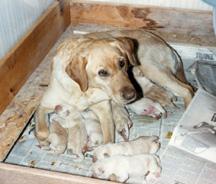
Picture that you have just adopted your first puppy and are already very attached to it and then it develops severe bloody diarrhea, vomiting and dehydration.
Like measles in the human population, parvovirus is contagious and cases are found in unvaccinated dogs. The virus is shed in infected dog’s feces and then ends up in the environment. Puppies may have some degree of protection through their maternal immunity when they are young, but they will need to receive a series of parvovirus vaccinations to ensure their own body will have lasting antibodies.
Parvovirus incubates in a puppy for 3 to 7 days before any symptoms are seen. The virus seeks rapidly replicating cells. It invades the lymph nodes, then the bone marrow and intestinal cells. White blood cells develop in the marrow, so many of them are killed. White blood cells provide the body with protection against invading organisms; a decreased white blood cell count puts an animal at increased risk for infection. The intestinal cells are destroyed, severely restricting the gut’s ability to absorb nutrients and fluids. Diarrhea and vomiting lead to extreme fluid loss, electrolyte imbalances and dehydration until the puppy’s body goes into shock. The intestinal cells normally provide a gut barrier, preventing digestive bacteria from entering the bloodstream. Loss of the intestinal barrier allows bacterial invasion of the whole body, leading to sepsis. Shock and sepsis can cause death.
Treatment of parvovirus is expensive – generally requiring multiple days of around the clock hospitalization in isolation from other dogs. Intravenous fluids are crucial to prevent extreme dehydration, as are intravenous antibiotics. In some situations, the blood protein level drops so low that a plasma transfusion is recommended. Oral antibiotics are not effective because they are not properly absorbed by the damaged gut. Affected puppies are very nauseated and anti-nausea medication is administered to them. Some medications that protect the gut can be given by mouth. The risk of mortality is much greater in patients that are not receiving intensive care in clinic.
Parvovirus can be diagnosed at our clinic by sampling a small amount of diarrhea. Intestinal parasites can also be screened for at the same time.
Parvovirus is present in every environment unless routine disinfection is used. We recommend not allowing your puppy to interact with dogs with an unknown vaccine status and waiting until your puppy has had its complete series of vaccines before visiting public outdoor areas. If you have had a parvo-positive puppy, please contact your veterinarian to determine how decontamination of a household is best performed. Parvovirus is not killed by freezing outside.
This is a preventable disease and proper vaccination can avoid the heartbreak of an extremely sick puppy. Mitchell Veterinary Services recommends that ALL puppies be vaccinated for parvovirus, regardless of their lifestyle or exposure to other dogs.

